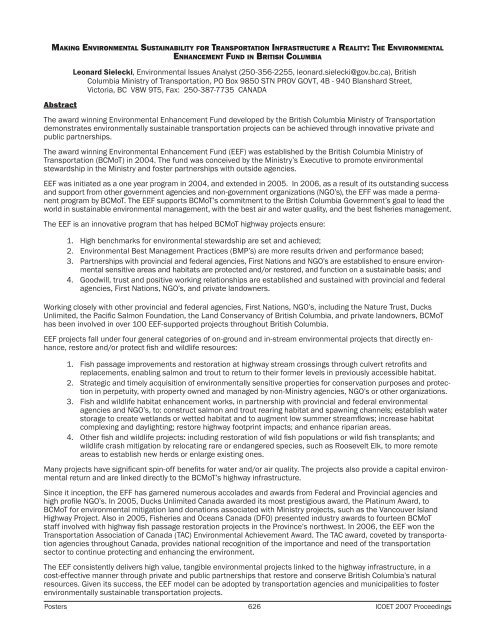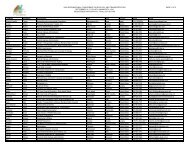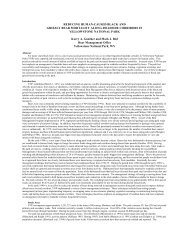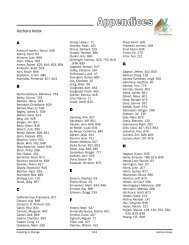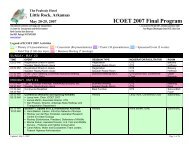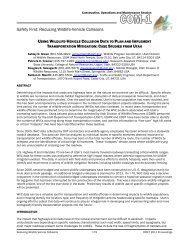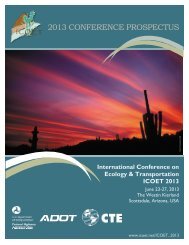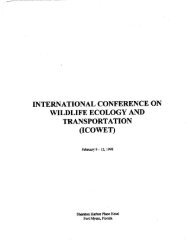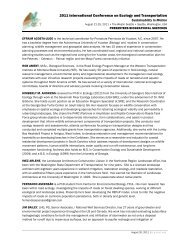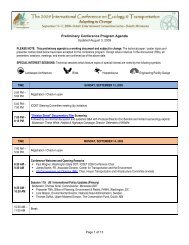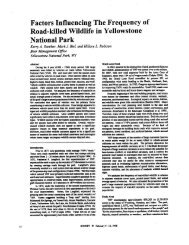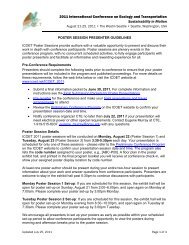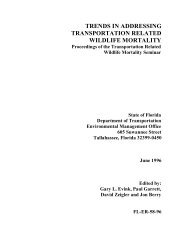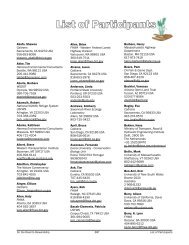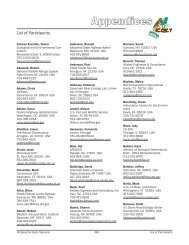Poster Sessions, pages 567-640 - ICOET
Poster Sessions, pages 567-640 - ICOET
Poster Sessions, pages 567-640 - ICOET
You also want an ePaper? Increase the reach of your titles
YUMPU automatically turns print PDFs into web optimized ePapers that Google loves.
Making Environmental Sustainability for Transportation Infrastructure a Reality: The Environmental<br />
Enhancement Fund in British Columbia<br />
Abstract<br />
Leonard Sielecki, Environmental Issues Analyst (250-356-2255, leonard.sielecki@gov.bc.ca), British<br />
Columbia Ministry of Transportation, PO Box 9850 STN PROV GOVT, 4B - 940 Blanshard Street,<br />
Victoria, BC V8W 9T5, Fax: 250-387-7735 CANADA<br />
The award winning Environmental Enhancement Fund developed by the British Columbia Ministry of Transportation<br />
demonstrates environmentally sustainable transportation projects can be achieved through innovative private and<br />
public partnerships.<br />
The award winning Environmental Enhancement Fund (EEF) was established by the British Columbia Ministry of<br />
Transportation (BCMoT) in 2004. The fund was conceived by the Ministry’s Executive to promote environmental<br />
stewardship in the Ministry and foster partnerships with outside agencies.<br />
EEF was initiated as a one year program in 2004, and extended in 2005. In 2006, as a result of its outstanding success<br />
and support from other government agencies and non-government organizations (NGO’s), the EFF was made a permanent<br />
program by BCMoT. The EEF supports BCMoT’s commitment to the British Columbia Government’s goal to lead the<br />
world in sustainable environmental management, with the best air and water quality, and the best fisheries management.<br />
The EEF is an innovative program that has helped BCMoT highway projects ensure:<br />
1. High benchmarks for environmental stewardship are set and achieved;<br />
2. Environmental Best Management Practices (BMP’s) are more results driven and performance based;<br />
3. Partnerships with provincial and federal agencies, First Nations and NGO’s are established to ensure environmental<br />
sensitive areas and habitats are protected and/or restored, and function on a sustainable basis; and<br />
4. Goodwill, trust and positive working relationships are established and sustained with provincial and federal<br />
agencies, First Nations, NGO’s, and private landowners.<br />
Working closely with other provincial and federal agencies, First Nations, NGO’s, including the Nature Trust, Ducks<br />
Unlimited, the Pacific Salmon Foundation, the Land Conservancy of British Columbia, and private landowners, BCMoT<br />
has been involved in over 100 EEF-supported projects throughout British Columbia.<br />
EEF projects fall under four general categories of on-ground and in-stream environmental projects that directly enhance,<br />
restore and/or protect fish and wildlife resources:<br />
1. Fish passage improvements and restoration at highway stream crossings through culvert retrofits and<br />
replacements, enabling salmon and trout to return to their former levels in previously accessible habitat.<br />
2. Strategic and timely acquisition of environmentally sensitive properties for conservation purposes and protection<br />
in perpetuity, with property owned and managed by non-Ministry agencies, NGO’s or other organizations.<br />
3. Fish and wildlife habitat enhancement works, in partnership with provincial and federal environmental<br />
agencies and NGO’s, to: construct salmon and trout rearing habitat and spawning channels; establish water<br />
storage to create wetlands or wetted habitat and to augment low summer streamflows; increase habitat<br />
complexing and daylighting; restore highway footprint impacts; and enhance riparian areas.<br />
4. Other fish and wildlife projects: including restoration of wild fish populations or wild fish transplants; and<br />
wildlife crash mitigation by relocating rare or endangered species, such as Roosevelt Elk, to more remote<br />
areas to establish new herds or enlarge existing ones.<br />
Many projects have significant spin-off benefits for water and/or air quality. The projects also provide a capital environmental<br />
return and are linked directly to the BCMoT’s highway infrastructure.<br />
Since it inception, the EFF has garnered numerous accolades and awards from Federal and Provincial agencies and<br />
high profile NGO’s. In 2005, Ducks Unlimited Canada awarded its most prestigious award, the Platinum Award, to<br />
BCMoT for environmental mitigation land donations associated with Ministry projects, such as the Vancouver Island<br />
Highway Project. Also in 2005, Fisheries and Oceans Canada (DFO) presented industry awards to fourteen BCMoT<br />
staff involved with highway fish passage restoration projects in the Province’s northwest. In 2006, the EEF won the<br />
Transportation Association of Canada (TAC) Environmental Achievement Award. The TAC award, coveted by transportation<br />
agencies throughout Canada, provides national recognition of the importance and need of the transportation<br />
sector to continue protecting and enhancing the environment.<br />
The EEF consistently delivers high value, tangible environmental projects linked to the highway infrastructure, in a<br />
cost-effective manner through private and public partnerships that restore and conserve British Columbia’s natural<br />
resources. Given its success, the EEF model can be adopted by transportation agencies and municipalities to foster<br />
environmentally sustainable transportation projects.<br />
<strong>Poster</strong>s 626 <strong>ICOET</strong> 2007 Proceedings


